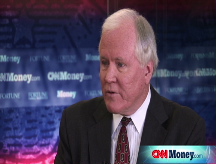Insurers jump on bailout speculation
While the rest of Wall Street tumbled, a handful of insurance companies rallied on reports that the Treasury Department may make investments in them.
NEW YORK (CNNMoney.com) -- While the rest of Wall Street got clobbered again Friday, a handful of insurance stocks rallied sharply on speculation that the Treasury Department may soon invest in companies in the battered industry.
After being down most of the morning, shares of MetLife (MET, Fortune 500) ended the day up 7%. Hartford Financial Services Group (HIG, Fortune 500) jumped 16% at the end of Friday's session after being down in the morning session. Prudential (PRU, Fortune 500) closed more than 6% higher after starting the day lower.
And Aflac (AFL, Fortune 500), the health and life insurance company that reported Thursday that its earnings had tumbled 76% in the fiscal third quarter, gained 7% by the end of the trading session Friday.
Shares of these insurance companies surged after the Washington Post and the Wall Street Journal both reported that the Treasury Department was considering extending funds from the $700 billion bank bailout, or Troubled Asset Relief Program (TARP), to the battered insurance group.
Steven D. Schwartz, a life insurance analyst at Raymond James, said that the rally in insurance stocks "had a lot to do with" the published reports.
Another analyst echoed that sentiment. "It was all about some of the headlines that started to come across," said John Nadel, senior insurance analyst at Sterne, Agee & Leach.
"It looks like there is now at least the potential that there could be [another] source of capital for the insurance companies," said Nadel.
However, both analysts expressed reservations as to whether the insurance industry actually needs a lifeline from the government, as the banking industry did.
"The balance sheet of the life insurance industry is significantly better than either the balance sheets of the investment or commercial banks," said Schwartz.
Stock prices of insurance stocks have declined "out of fear that the life insurance industry is next, that the life insurance industry is primed to have a number of failures" said Schwartz. "That is not going to happen."
Nadel said that the status of life insurance companies depends on how the credit crisis is resolved. "Whether insurance companies and life insurance companies in particular need to be part of the program is going to be determined in large part by how corporate credit behaves," said Nadel.
Insurance companies depend on longer termed investment securities for their funding than banks do, explained Nadel.
"So long as the insurance companies are positioned to be able to hold through a tumultuous market, so long as these securities recover in value, then they should be fine," he said.
The insurance firms have all been hit hard as the value of many of their investments in the financial industry and other stocks have evaporated during the credit crisis.
Aflac suffered from investments in Lehman Brothers and Washington Mutual as well as struggling automaker Ford and warned that its fourth quarter results would be hurt due to exposure to Icelandic banks.
Other insurers have also had exposure to mortgage financing giants Fannie Mae and Freddie Mac as well as insurer AIG.
A lot of uncertainty in the market remains, however. MetLife, Hartford and Prudential, which have already warned that third quarter results will be worse than expected, are all set to report their quarterly reports next Wednesday afternoon. ![]()




